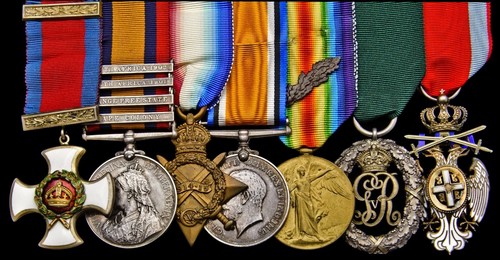
Auction: 14002 - Orders, Decorations, Campaign Medals and Militaria
Lot: 53
A Fine Great War D.S.O. Group of Seven to Lieutenant-Colonel A.E. Cronshaw, Manchester Regiment, Who Fought With Distinction in the 5th Battalion at Gallipoli: By the End of December 1915, Not One of the Battalion's 34 Officers Remained, the Majority Having Been Killed or Wounded
a) Distinguished Service Order, G.V.R., silver-gilt and enamel, with integral top riband bar, in Garrard, London, case of issue
b) Queen's South Africa 1899-1902, four clasps, Cape Colony, Orange Free State, South Africa 1901, South Africa 1902, unofficial retaining rod at top (Lieut. A.E. Cronshaw. Vol. Co.Manch. Rgt.)
c) 1914-15 Star (Major A.E. Cronshaw. Manch. R.)
d) British War and Victory Medals, M.I.D. Oak Leaves (Lt. Col. A.E. Cronshaw.)
e) Territorial Decoration, G.V.R., silver (Hallmarks for London 1913) and silver-gilt, reverse engraved 'Lt. Col. A.E. Cronshaw 5th. Bn. Manchester Regt. 7th. June 1917', lacking integral top riband bar
f) Serbia, Kingdom, Order of the White Eagle, Military Division, Officer's breast Badge, 65mm including crown suspension x 35mm, silver-gilt and enamel, one sword bent on last, generally very fine or better (7)
D.S.O. London Gazette 1.1.1918 Maj. (A./Lt -Col ) Arthur Edwin Cronshaw, Manch. R.
'For distinguished service in the Field.'
T.D. London Gazette 7.6.1917 Lt.-Col. Arthur Edwin Cronshaw, Manchester Regiment
Sebia, Order of the White Eagle, 4th Class London Gazette 15.2.1917 Captain (temporary Major) Arthur Edwin Cronshaw, Manchester Regiment
'For distinguished services rendered during the course of the campaign.'
Lieutenant-Colonel Arthur Edwin Cronshaw, D.S.O., T.D., (1874-1924) was educated at Manchester Grammar School. Commissioned Second Lieutenant, 1st Volunteer Battalion, Manchester Regiment, November 1896, he was promoted Lieutenant, July 1897, and served with the 2nd Battalion Manchester Regiment in South Africa, from March 1901 to May 1902, and was present at the operations in Cape Colony in April 1901, and in the Orange River Colony from May 1901 to May 1902; on his return to the U.K. he was promoted Captain, 7.1.1903.
Mobilised with the 5th Battalion on the outbreak of the Great War, 4.8.1914, he was promoted temporary Major, 31.8.1914. Landing at Cape Helles, Gallipoli on 6.5.1915, he went on to attract the approbation of his Commanding Officer, Colonel Henry Darlington, as evidenced by the following extracts taken from the latter's Letters From Helles (London, 1936): '... Old Cronshaw got a bump on the head during our Straffe last night, but no damage done. I think it was a bit of a stone from the parapet as a machine-gun knocked our sandbags to pieces just where he and I were standing. He is a perfect marvel and doing most excellent work. I only hope the old Turk won't bag him. On 7 August he climbed out of our trench in the attempted attack on H.11.B. and was promptly blown in again by a shell. It did not seem to worry him at all and all he suffered from was a bit of stiffness. We pull his leg about it, as you can imagine' .
'... Cronshaw, Lee and I got a rifle and rifle grenades and two of our men, and between us, none of us knowing in the least how to use the beastly things, loosed off some grenades. By sheer fluking, we got our second and third bombs right bang in the Turk trench, apparently clean in the lair of the sniper. We trust we blew him up, but at any rate the sniping there is not so confident as it was'.
'... Ernest Fletcher is not well and is resting in his valise; Cronshaw is laid up and I am afraid he will have to go to hospital. There are only three now unlisted of the old originals (Officers), Self, Fletcher and Cronshaw, and I am afraid that there will be only two by this evening' [Darlington, too, was evacuated sick a few weeks later].
Having miraculously survived the horrors of Gallipoli, Cronshaw was appointed to the command of the 1/7th Battalion, Manchesters, and joined his men in the Egyptian Theatre of War in June 1916. Taking up forward positions near Gilban on the eastern side of the Canal, he led the Battalion at the Battle of Romani on 4.8.1916, an action that resulted in the withdrawal of a German-led Turkish Army numbering some 18,000 men. Soon afterwards he was informed of the pending award of his Fourth Class Order of the Serbian Eagle, 'a long delayed recognition of his magnificent work in Gallipoli'. In early 1917, Cronshaw and the 1/7th set sail for France, having accompanied the pursuit of the Turks as far as El Arish on the Palestine border. Arriving at Marseilles on 10.3.1917, the Battalion was moved up to the Epehy Sector and, in June, to the Havrincourt Sector. But it was not until late September that Cronshaw and the 1/7th were really back in the thick of it, on this occasion at the Third Battle of Ypres, the action that almost certainly resulted in the award of his D.S.O. Suffering from the effects of gas, the stress of command and the tribulations of the unsuccessful programme to 'exchange' Battalion C.Os within frontline Regiments - in Cronshaw's case the 1/8th Worcestershire Regiment - he was evacuated home in January 1918. Not, perhaps, surprisingly, given the strain of constant active employ (and command) over a period safely in excess of two years, the 'Medics' quickly ruled that Colonel Cronshaw was 'only fit for home service', so ending a remarkable operational career.
Subject to 20% VAT on Buyer’s Premium. For more information please view Terms and Conditions for Buyers.
Sold for
£3,200




